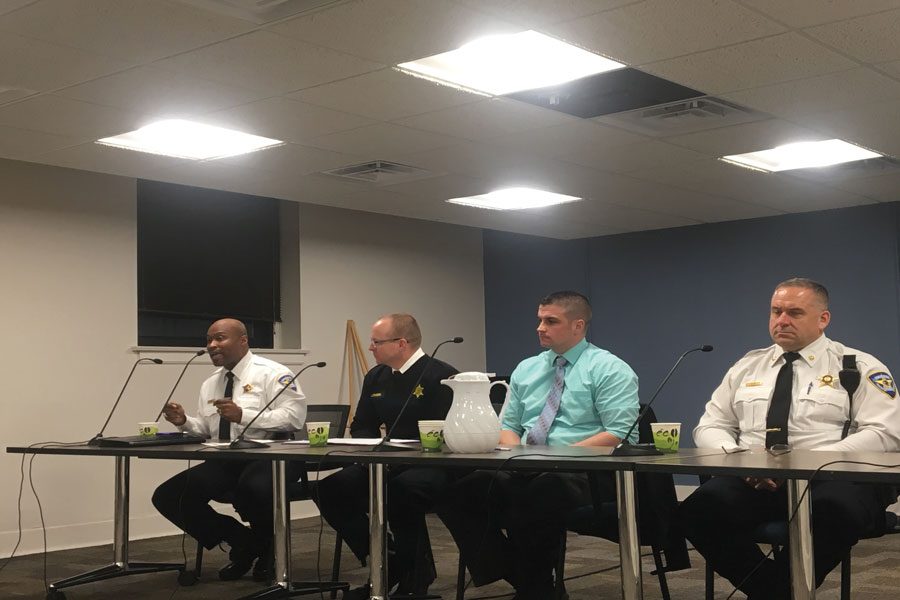EPD officers discuss transparency, community relations at town hall
Clare Proctor/Daily Senior Staffer
Evanston Police Department officials James Pickett, Jeff Faison, Tom Giese and Ryan Glew sit on a panel at a town hall meeting Thursday. The panel discussed the need for increased communication and transparency between police and community members.
February 22, 2019
A panel of Evanston Police Department officials encouraged more transparency and open communication between police officers and community members at a town hall meeting Thursday.
The meeting was the final segment of a four-part series on community relations hosted by the EPD, which began in 2017. Thursday’s town hall, titled “Rights, Responsibilities and Reasonability,” discussed community engagement in the policing process, as well as how to increase the level of cooperation between residents and officers in Evanston.
Deputy Chief James Pickett, who sat on the panel, said officers understand the “angst” and mistrust between community members and the police.
In light of this, Pickett emphasized the importance of open dialogue about policing. He said he welcomes criticism.
“We’re still human, and mistakes happen,” Pickett said. “It’s a good thing to have this back-and-forth and have that open dialogue.”
Pickett said community policing is the “most important tool” in improving police relations in Evanston, a tool he said the EPD believes in.
Sgt. Jeff Faison, Detective Tom Giese and Cmdr. Ryan Glew also sat on the panel. The EPD officials answered questions from community members about how officers define rights and responsibilities in policing.
Many residents raised questions about the rights of police officers when investigating community members, such as drivers being asked to exit their vehicles when stopped for a traffic violation.
Pickett said police officers have a legal right to do so, but without probable cause — such as the odor of marijuana or “furtive movements” — officers cannot search the driver or vehicle. He said EPD officers have the responsibility to explain why they stopped drivers, increasing communication in those situations.
Panelists added that community members can request that an officer’s supervisor respond to the scene at any point.
“If you need that third party there, if you need somebody there that you feel is going to have a better assessment of the situation, that is something that you should request, you have a right to request,” Glew said. “And it’s typically going to come to a better outcome and better satisfaction for both parties.”
Glew said in an interview that the town hall offered a platform for the EPD to lay out its policing philosophy. He said the EPD benefits from this level of community engagement, and the questions residents asked were “reasonable” and “insightful.”
Gilo Kwesi Logan, a leadership and diversity consultant who facilitated the meeting, told The Daily that the EPD is moving on an “upward trajectory” in building a relationship of trust with the community — especially under the new leadership of Chief Demitrous Cook, who was sworn in Jan. 2. Cook’s “head and his heart are in the right place,” Logan said.
He said the town hall was a successful dialogue between the police department and the community.
“These sessions definitely don’t fix anything,” Logan said. “But it definitely helps to move things forward.”
Email: [email protected]
Twitter: @ceproctor23
Related Stories:
– Evanston Police report 13 percent reduction in crashes on Ridge Avenue
– Police, fire departments boast decrease in crime, efficient response time


